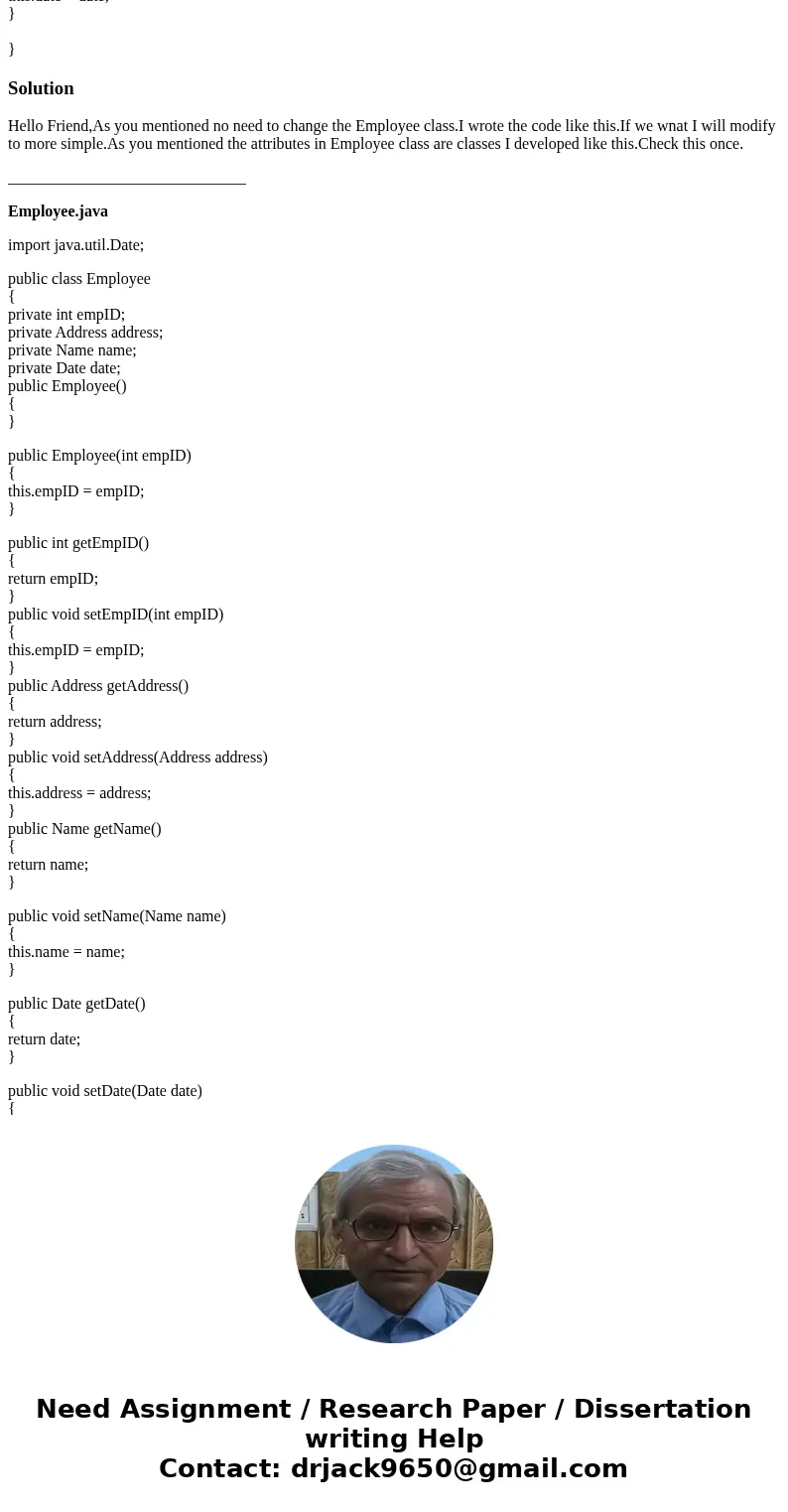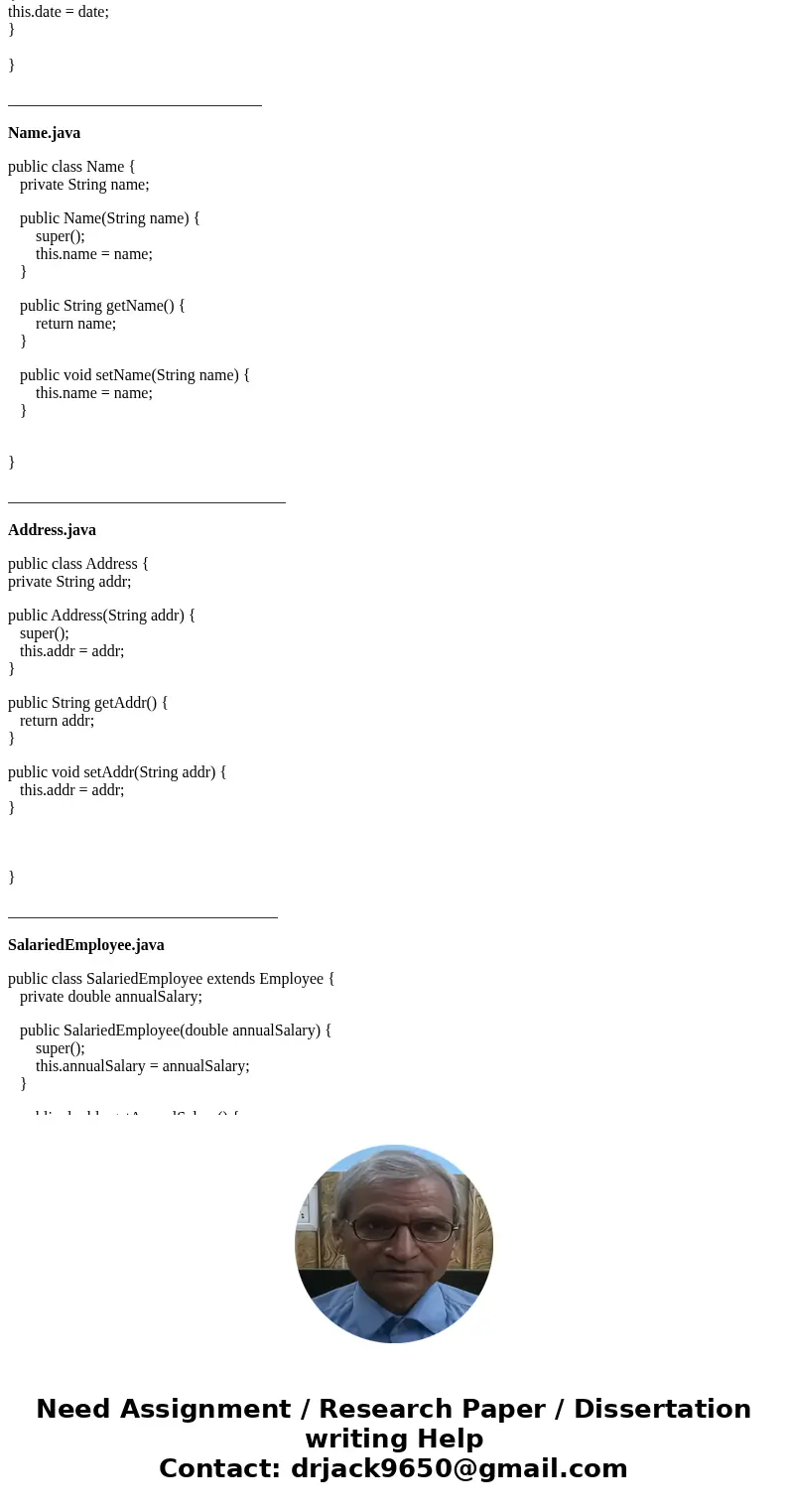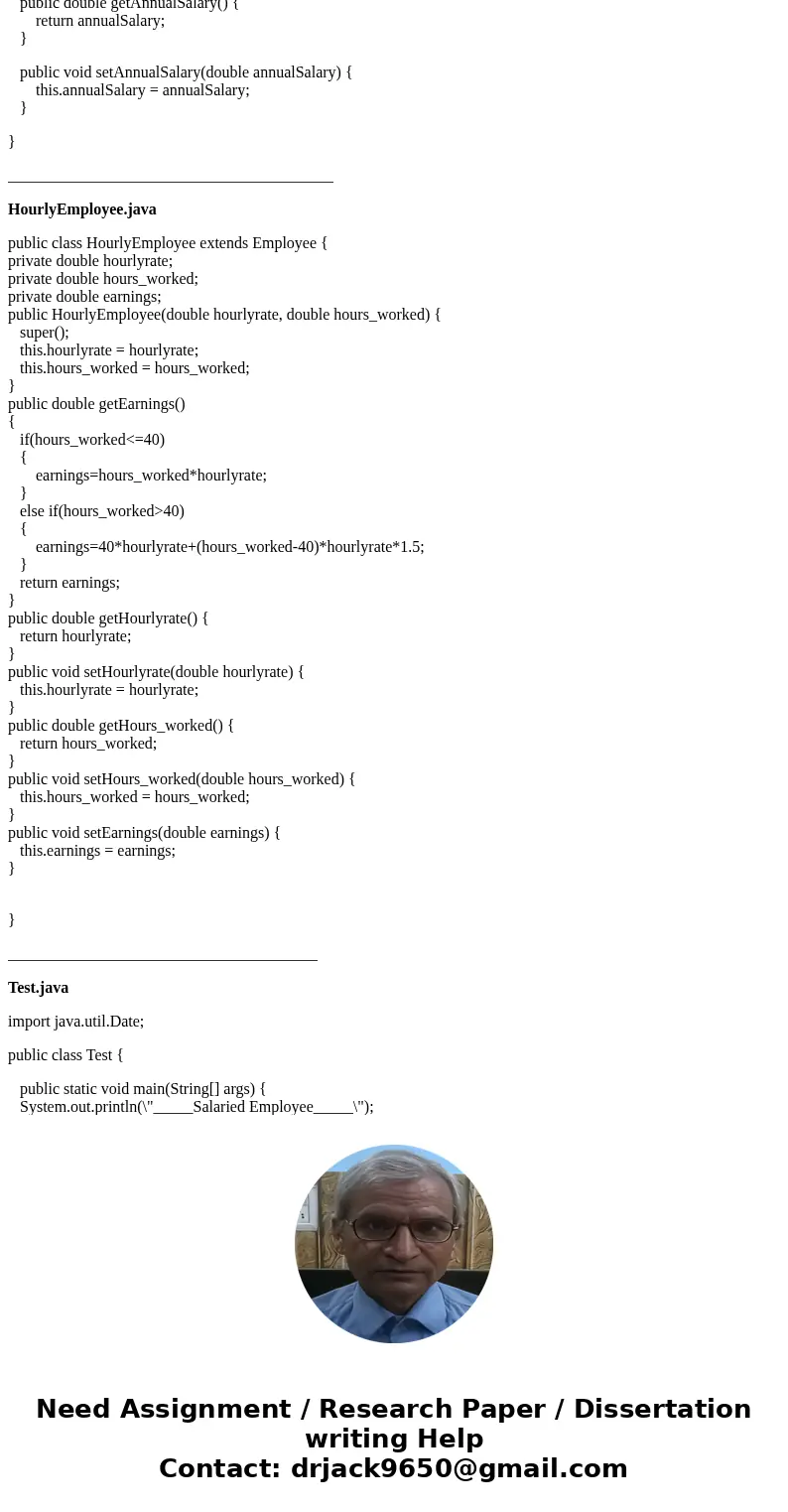Java Design two subclasses of EmployeeSalariedEmployee and H
Java: Design two subclasses of Employee…SalariedEmployee and HourlyEmployee. A salaried employee has an annual salary attribute. An hourly employee has an hourly pay rate attribute, an hours worked attribute, and an earnings attribute. An hourly employee that works more than 40 hours gets paid at 1.5 times their hourly pay rate. You will decide how to implement constructors, getters, setters, and any other methods that might be necessary. 1. (20 points) Draw a UML diagram for the classes. 2. (80 points) Implement the classes, and write a test program that creates a salaried employee and two hourly employees. One of the hourly employees should have hours worked set to less than 40 and one should have hours worked set to more than 40. The test program should display all attributes for the three employees. To keep things simple, the employee classes don’t need to do any editing.
public class Employee
{
private int empID;
Address address;
Name name;
Date date;
public Employee()
{
}
public Employee(int empID)
{
this.empID = empID;
}
public int getEmpID()
{
return empID;
}
public void setEmpID(int empID)
{
this.empID = empID;
}
public Address getAddress()
{
return address;
}
public void setAddress(Address address)
{
this.address = address;
}
public Name getName()
{
return name;
}
public void setName(Name name)
{
this.name = name;
}
public Date getDate()
{
return date;
}
public void setDate(Date date)
{
this.date = date;
}
}
Solution
Hello Friend,As you mentioned no need to change the Employee class.I wrote the code like this.If we wnat I will modify to more simple.As you mentioned the attributes in Employee class are classes I developed like this.Check this once.
______________________________
Employee.java
import java.util.Date;
public class Employee
{
private int empID;
private Address address;
private Name name;
private Date date;
public Employee()
{
}
public Employee(int empID)
{
this.empID = empID;
}
public int getEmpID()
{
return empID;
}
public void setEmpID(int empID)
{
this.empID = empID;
}
public Address getAddress()
{
return address;
}
public void setAddress(Address address)
{
this.address = address;
}
public Name getName()
{
return name;
}
public void setName(Name name)
{
this.name = name;
}
public Date getDate()
{
return date;
}
public void setDate(Date date)
{
this.date = date;
}
}
________________________________
Name.java
public class Name {
private String name;
public Name(String name) {
super();
this.name = name;
}
public String getName() {
return name;
}
public void setName(String name) {
this.name = name;
}
}
___________________________________
Address.java
public class Address {
private String addr;
public Address(String addr) {
super();
this.addr = addr;
}
public String getAddr() {
return addr;
}
public void setAddr(String addr) {
this.addr = addr;
}
}
__________________________________
SalariedEmployee.java
public class SalariedEmployee extends Employee {
private double annualSalary;
public SalariedEmployee(double annualSalary) {
super();
this.annualSalary = annualSalary;
}
public double getAnnualSalary() {
return annualSalary;
}
public void setAnnualSalary(double annualSalary) {
this.annualSalary = annualSalary;
}
}
_________________________________________
HourlyEmployee.java
public class HourlyEmployee extends Employee {
private double hourlyrate;
private double hours_worked;
private double earnings;
public HourlyEmployee(double hourlyrate, double hours_worked) {
super();
this.hourlyrate = hourlyrate;
this.hours_worked = hours_worked;
}
public double getEarnings()
{
if(hours_worked<=40)
{
earnings=hours_worked*hourlyrate;
}
else if(hours_worked>40)
{
earnings=40*hourlyrate+(hours_worked-40)*hourlyrate*1.5;
}
return earnings;
}
public double getHourlyrate() {
return hourlyrate;
}
public void setHourlyrate(double hourlyrate) {
this.hourlyrate = hourlyrate;
}
public double getHours_worked() {
return hours_worked;
}
public void setHours_worked(double hours_worked) {
this.hours_worked = hours_worked;
}
public void setEarnings(double earnings) {
this.earnings = earnings;
}
}
_______________________________________
Test.java
import java.util.Date;
public class Test {
public static void main(String[] args) {
System.out.println(\"_____Salaried Employee_____\");
SalariedEmployee se=new SalariedEmployee(50000);
se.setEmpID(1234);
se.setName(new Name(\"Williams\"));
se.setAddress(new Address(\"4,Richmond Street\"));
se.setDate(new Date(\"Oct-11-2014\"));
System.out.println(\"Employee Id :\"+se.getEmpID());
System.out.println(\"Employee Name :\"+se.getName().getName());
System.out.println(\"Employee Address :\"+se.getAddress().getAddr());
System.out.println(\"Joining Date :\"+se.getDate());
System.out.println(\"The Annual Salary :\"+se.getAnnualSalary());
System.out.println(\"\ _____Hourly Employee_____\");
HourlyEmployee he1=new HourlyEmployee(8.5,39);
he1.setEmpID(4567);
he1.setName(new Name(\"Kane\"));
he1.setAddress(new Address(\"5,lake View Road\"));
he1.setDate(new Date(\"Nov-12-2015\"));
System.out.println(\"Employee Id :\"+he1.getEmpID());
System.out.println(\"Employee Name :\"+he1.getName().getName());
System.out.println(\"Employee Address :\"+he1.getAddress().getAddr());
System.out.println(\"Joining Date :\"+he1.getDate());
System.out.println(\"The Earnings Of An HourlyEmployee :\"+he1.getEarnings());
System.out.println(\"\ _____Hourly Employee_____\");
HourlyEmployee he2=new HourlyEmployee(9.5,47);
he2.setEmpID(1111);
he2.setName(new Name(\"John\"));
he2.setAddress(new Address(\"17,Villey Parley Street\"));
he2.setDate(new Date(\"Dec-13-2011\"));
System.out.println(\"Employee Id :\"+he2.getEmpID());
System.out.println(\"Employee Name :\"+he2.getName().getName());
System.out.println(\"Employee Address :\"+he2.getAddress().getAddr());
System.out.println(\"Joining Date :\"+he2.getDate());
System.out.println(\"The Earnings Of An HourlyEmployee :\"+he2.getEarnings());
}
}
______________________________________________
Output:
_____Salaried Employee_____
Employee Id :1234
Employee Name :Williams
Employee Address :4,Richmond Street
Joining Date :Sat Oct 11 00:00:00 IST 2014
The Annual Salary :50000.0
_____Hourly Employee_____
Employee Id :4567
Employee Name :Kane
Employee Address :5,lake View Road
Joining Date :Thu Nov 12 00:00:00 IST 2015
The Earnings Of An HourlyEmployee :331.5
_____Hourly Employee_____
Employee Id :1111
Employee Name :John
Employee Address :17,Villey Parley Street
Joining Date :Tue Dec 13 00:00:00 IST 2011
The Earnings Of An HourlyEmployee :479.75
_______________Thank You






 Homework Sourse
Homework Sourse